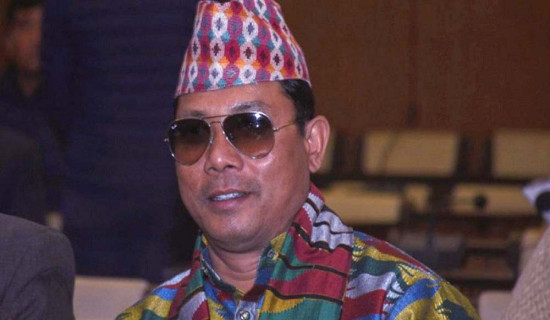- Friday, 23 January 2026
Mahanagar: Positive outlook makes difference
Kathmandu, Aug. 28: Upon hearing about ‘metropolitan city’ and especially ‘Kathmandu’, people often think of boundless opportunities, job opportunities and state-of-the-art facilities. Many from the villages are drawn to Kathmandu, fueled by dreams of a prosperous future. However, for some, the city’s challenges can darken its attraction, turning their dreams into moments of disillusionment.
‘Mahanagar (One Night in Kathmandu)’, a film directed by Mohan Rai, revolves around two pivotal characters, Aashish, played by Karma Shakya, and Khusi, portrayed by Menuka Pradhan.
The film delves into a series of actions and emotions that unfold over the course of a single night in Kathmandu.
Aashish and Khusi’s paths cross unexpectedly when they both rush to help a middle-aged man involved in a road accident. United by their shared act of compassion, they take the injured stranger to the hospital.
Even when the doctor warns them of potential police involvement typical of such incidents, Aashish’s response stands as a beacon of hope, reminding the audience that even in the self-absorbed world, acts of genuine humanity still shine brightly.
After receiving various national and international awards and recognitions, the team finally premiered the film on August 25.
Shot against the backdrop of Kathmandu, the movie delves into a series of events unfolding over one pivotal night, ushering in deep changes in the main character's perspectives. The unexpected meeting, intertwined with the developments and conversations of that evening, stands at the heart of the narrative.
While the plotline seems straightforward, it delves deep into the psyche of Khusi, an aspiring poet. Once full of hope, Khusi moved to Kathmandu against her parents' wishes, envisioning a successful career in the bustling city. However, her dreams crumbled amidst the challenging city life and its people, pushing her towards depression and a longing for her village. Yet, her unexpected interaction with Aashish changes her perception. By the end of the night, she returns to her village, not in defeat, but with a newfound sense of contentment.
On the other hand, Aashish, a tour guide from Darjeeling, has come to Nepal for his work. While growing up, he lost both his parents as his mother eloped with somebody and his father carefully raised him but his father too died. He became alone, leading to frustration but one small quotation from a book changed his life and decided to live his life to the fullest. Aashish’s life demonstrates that by embracing a positive outlook, even the most challenging moments can be overcome.
In the film, Aashish’s compelling philosophical insights shine as he endeavours to uplift and motivate unhappy Khusi throughout various scenes.
With memorable lines like, ‘Yesterday was history, tomorrow is a mystery, and today is a gift,’ and the notion that one can live life viewing ‘everything as a miracle or nothing as a miracle,’ the narrative is rich with motivation.
The world's current situation is deeply troubling, largely due to the impact of the COVID-19 pandemic, the Russia-Ukraine war, and the subsequent financial crisis. Many people are overwhelmed with frustration, and tragically, some have even taken their own lives because of excessive stress. However, Aashish's role in the film conveys a vital message that regardless of how challenging the circumstances, life must continue.
On the contrary, ‘Khusi’, which translates to ‘happiness’ portrays a character immersed in sadness. However, after spending a night with Aashish, she discovers the true essence of joy and smiles once again.
The two characters in the film convey the profound message that even a small spark of motivation can alter life's track and illuminate the path to a fulfilling existence.
Director and writer Mohan Rai has poured his heart into crafting such a compelling story. Both Karma and Menuka have delivered powerful performances, bringing depth to their characters.
Rai's storytelling and directorial skills highlight his dedication to detailed research, ensuring even the subtlest nuances are conveyed simply for all audiences. Instead of delving into academic philosophy, the film offers insights into navigating life's challenges.
The film's background score complements the nighttime scenes perfectly. While the majority of the cinematography is commendable, occasional unstable camera work detracted slightly from the overall immersion.
Mahanagar is not a love story, romance and thrill, but it simply shows even the difficult times shall pass and one has to continue in life with enthusiasm.
Simultaneously, the movie deeply portrays the prevailing issues such as political unrest, unemployment, and foreign employment.

















